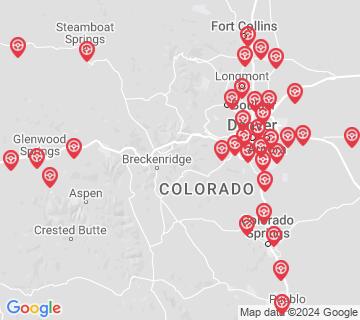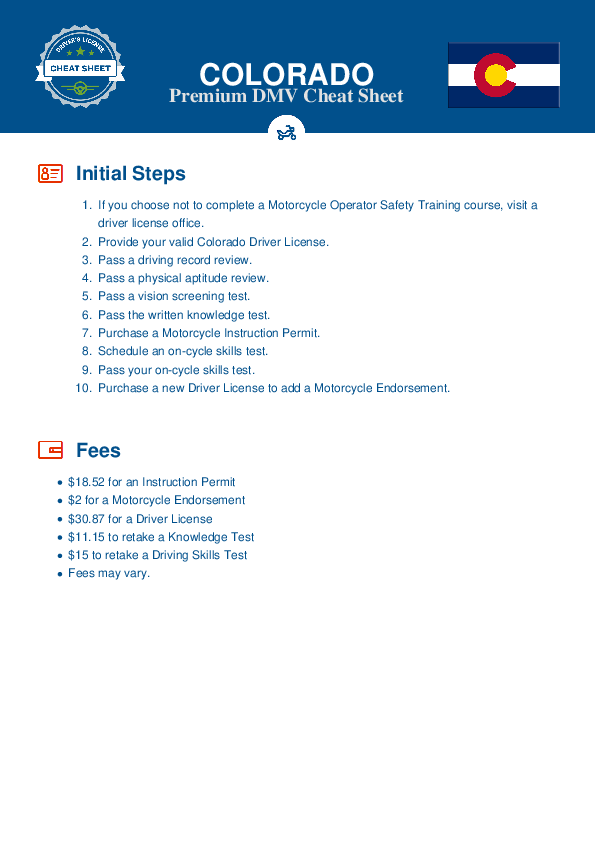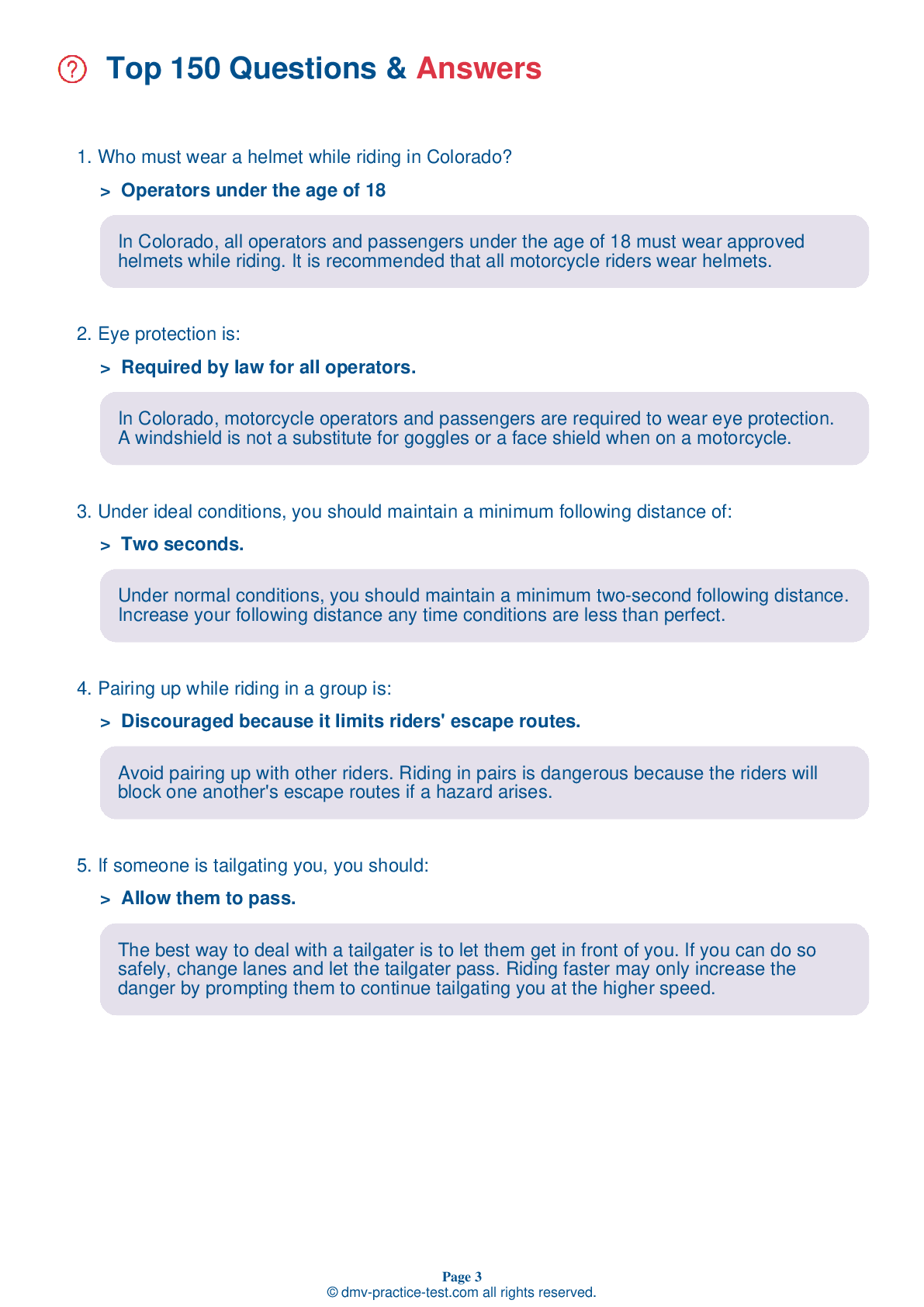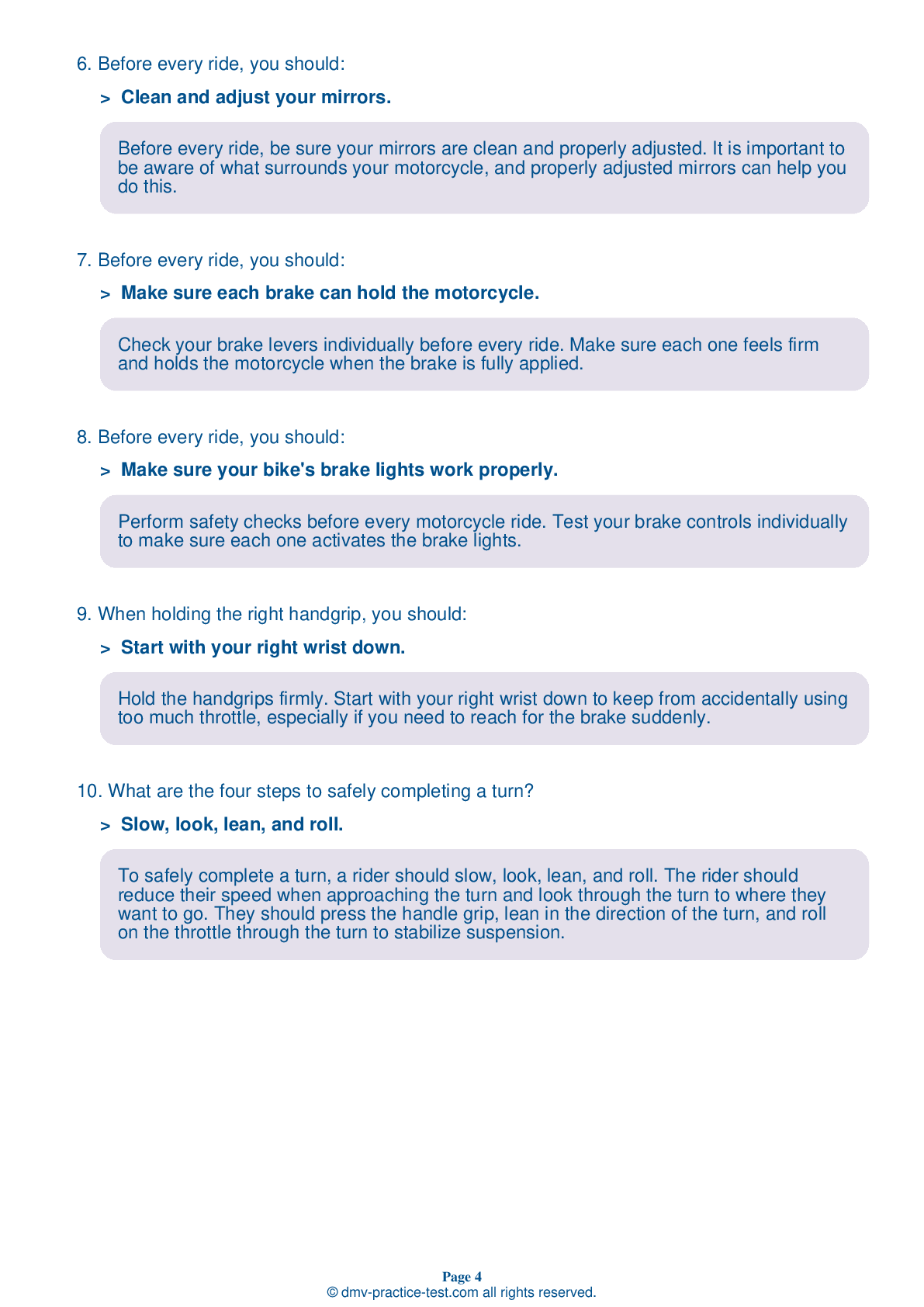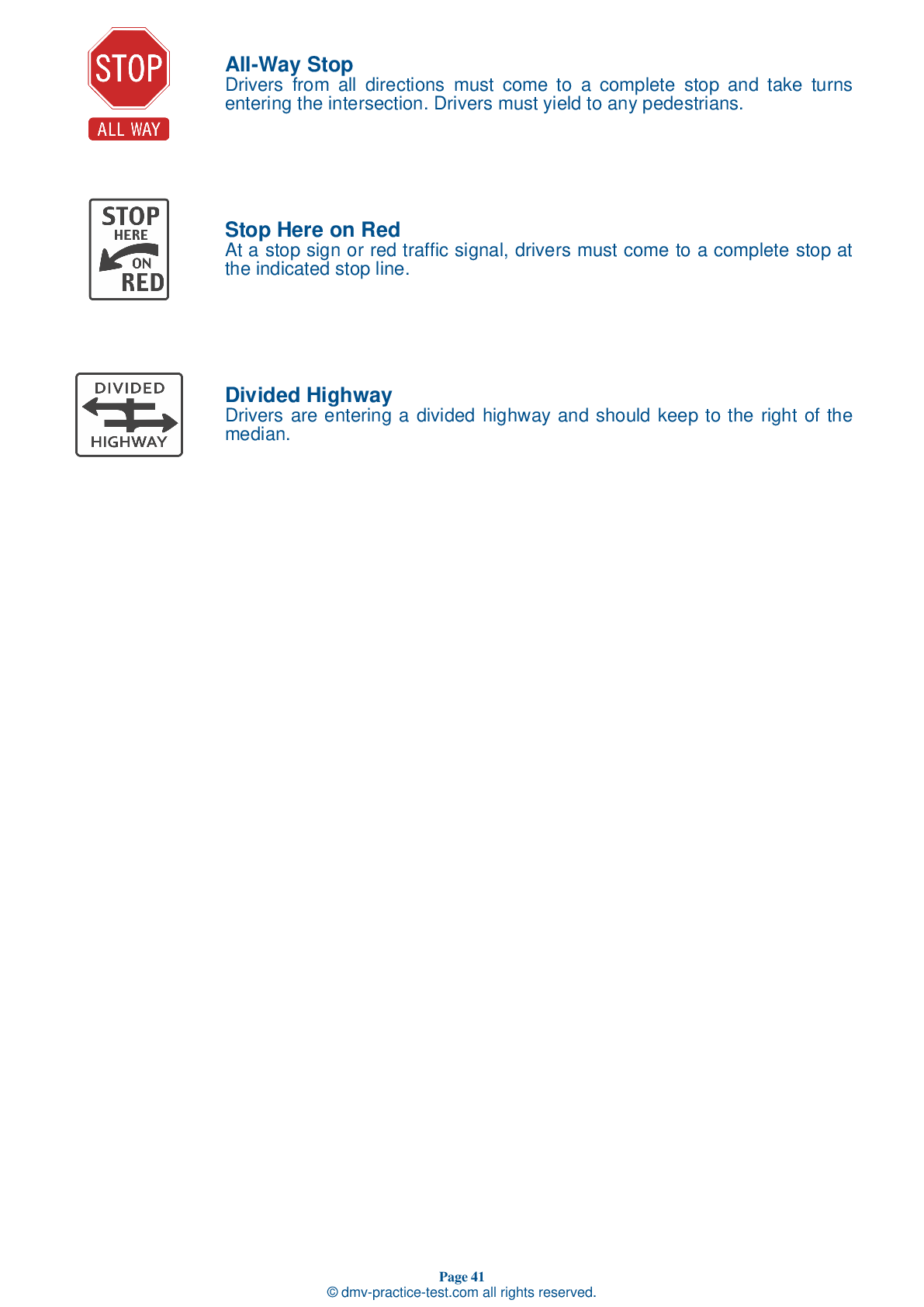DMV Permit Test #3
Motorcycle Test | License CO 2026 | FREE Online Practice! #3 Page 2 of 4
Take this FREE motorcycle test (license in CO 2026) to check your knowledge of the road rules. To improve your results, download a motorcycle handbook online, study theory, and practice for free on our website. Still worried about how to get a motorcycle license in Colorado in 2026? Check our website for more sample tests, train as much as possible, and boost your grades!
25
21
16
7 . What could happen if a motorcyclist takes a turn too fast?
All of the above.
Riders often try to take curves or turns too fast. When they can’t hold the turn, they end up crossing into another lane of traffic or going off the road. Riders also often overreact and brake too hard, causing a skid and loss of control.
8 . Where is the horn button usually located?
By the right footrest
Make sure that you are aware of the locations of all your motorcycle's controls before beginning to ride. The horn button on a motorcycle is usually located next to the left handgrip.
9 . The faster you drink:
The more likely you will be able to evade being pulled over.
The faster you drink, the more alcohol will accumulate in your body. It is never safe to operate a motor vehicle after drinking alcohol in any amount.
10 . This sign means:
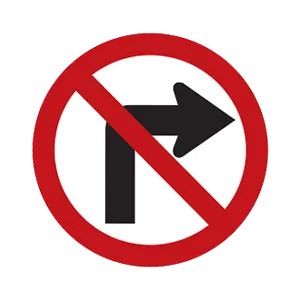
Left lane must turn left.
Regulation signs regulate traffic speed and movement, displaying rules which drivers must obey. This regulation sign means that right turns are prohibited.
11 . This sign means:
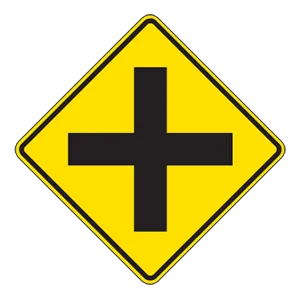
Turn right or go straight.
Warning signs prepare drivers for upcoming road conditions and hazards and are usually yellow with black markings. This sign alerts drivers to an upcoming intersection.
12 . A primary cause of single-vehicle motorcycle collisions is:
Motorcyclists running off the road while trying to avoid a collision with another vehicle.
A primary cause of single-vehicle collisions is motorcyclists running too wide in a curve or turn. Taking a turn too wide can cause a motorcycle to leave the roadway or collide with an object.
Search the best driving school in your neighbourhood
2026 Colorado | Frequently Asked Questions
To acquire a motorcycle driver's license in Colorado, you must first pass a written exam to receive a motorcycle instruction permit. After holding the permit for 12 months, you can then take the skills test. Upon passing, you can apply for a motorcycle endorsement on your driver's license. Alternatively, you can complete an approved Motorcycle Operator Safety Training (MOST) course to bypass the skills test.
In Colorado, the minimum age for obtaining a motorcycle driver's license is 16. However, individuals between the ages of 15 and 16 can obtain a motorcycle instruction permit. For those under 18, completion of a Motorcycle Operator Skills Training (MOST) course is required before applying for a motorcycle endorsement or license.
Yes, in Colorado, you need a dedicated license to legally ride a motorcycle. You can either get a motorcycle endorsement (M) added to your existing driver's license, or if you only want to operate motorcycles, you can apply for a "Motorcycle-Only" license. Both require passing written and driving tests or completing an approved training course.
To apply for a motorcycle driver's license in Colorado, you need to provide several documents: proof of your identity (like a birth certificate or passport), proof of your Social Security number, and proof of Colorado residency. If you're under 18, you'll also need a Driver's Ed completion certificate. If you've completed a MOST course, bring your certificate to waive the tests.
Yes, you will need to take a written exam for a motorcycle license in Colorado unless you complete a Motorcycle Operator Safety Training course. The written test covers topics such as traffic laws, safety rules, and best practices for operating a motorcycle. This exam is designed to ensure you have the necessary knowledge to safely navigate Colorado roads on a motorcycle.
The motorcycle written test in Colorado covers a range of topics related to motorcycle operation and safety. These include traffic laws, road signs, safe riding techniques, handling dangerous situations, and motorcycle-specific laws. The test also covers information about protective gear, passenger rules, and the effects of alcohol and drugs on riding ability.
Yes, in Colorado, if you successfully complete a Motorcycle Operator Safety Training (MOST) course, you will not be required to take the written or driving test at the DMV for your motorcycle endorsement. The course provides comprehensive training and upon completion, you receive a certificate which you can present at the DMV.
To enroll in a motorcycle training course in Colorado, you first need to find a state-approved training school. You can do this by visiting the Colorado DMV website. Once you've selected a school, contact them to register for a course. You'll typically need to pay a fee. Courses usually include both classroom instruction and hands-on riding practice. Completion may waive the skills test for licensing.
No, you don't need to possess your own motorcycle for the license test in Colorado. You can use any street-legal, registered, and insured motorcycle for the test. If the motorcycle is not registered in your name, you must have written permission from the owner. Helmet and eye protection are mandatory during the test.
Yes, you can use a friend's motorcycle for the driver's license evaluation in Colorado. However, the motorcycle must be street-legal, registered, and insured. You must also have written permission from the owner if the motorcycle is not registered in your name. Wearing a helmet and eye protection is mandatory during the test.
Yes, the Colorado motorcycle driving test evaluates specific handling skills. These include: left and right turns, sudden stops, swerving or turning quickly to avoid an obstacle, normal stops, starting on a hill, U-turns, and cone weaving. The test ensures riders can safely handle a motorcycle in various traffic conditions and situations.
In Colorado, new motorcycle drivers under 18 must first obtain a motorcycle instruction permit. This permit comes with several restrictions: they cannot carry passengers, they cannot drive on highways, and they are not allowed to drive from dusk till dawn. After holding the permit for 12 months, they can apply for a motorcycle endorsement on their driver's license.
Yes, your Colorado motorcycle license or endorsement is valid across the United States, due to the Full Faith and Credit Clause of the U.S. Constitution. However, when riding in other states, you must comply with their specific traffic laws, which can include helmet and equipment requirements that differ from those in Colorado.
In Colorado, motorcycle helmet laws are age-specific. Riders and passengers under the age of 18 are required by law to wear a DOT-approved helmet. For those 18 and older, wearing a helmet is not mandatory, but is highly recommended for safety reasons. All riders, regardless of age, are required to wear eye protection unless the motorcycle has a windscreen.
Yes, Colorado offers two types of motorcycle licenses. The M endorsement allows you to operate 2 and 3-wheel motorcycles. The 3-wheel (3) restriction is for those who only want to operate 3-wheel motorcycles. To obtain these, you must pass a written test and a motorcycle driving test, or complete a Motorcycle Operator Skills Training (MOST) program.
Yes, in Colorado, you can add supplementary endorsements to your motorcycle license. These include a 3-wheel motorcycle endorsement (M endorsement with a "3" restriction) if you pass the 3-wheel skills test. Remember that each endorsement requires passing additional written and skills tests, and may have specific age and safety course requirements.
Yes, in Colorado, the motorcycle license test is available in several languages other than English. These include Spanish, Korean, and Vietnamese among others. However, it's advisable to check with your local DMV office for a complete list of available languages before scheduling your test.
An effective strategy to prepare for the motorcycle license test in Colorado is to study the Colorado Motorcycle Operator's Handbook thoroughly. This guide covers all the information you'll need for the test. Practice exams are also available online. Additionally, consider taking a motorcycle safety course, which can provide hands-on training and further prepare you for the test.
Yes, in Colorado, the motorcycle written exam can be taken in several languages other than English. These include Spanish, Korean, and Vietnamese among others. However, it's advisable to check with your local DMV office for a complete list of available languages before scheduling your test.
If you don't pass the motorcycle written test in Colorado, you'll need to wait one day before you can retake it. The Colorado DMV allows you to retake the test as many times as necessary until you pass. However, keep in mind that each attempt may require a separate testing fee.
